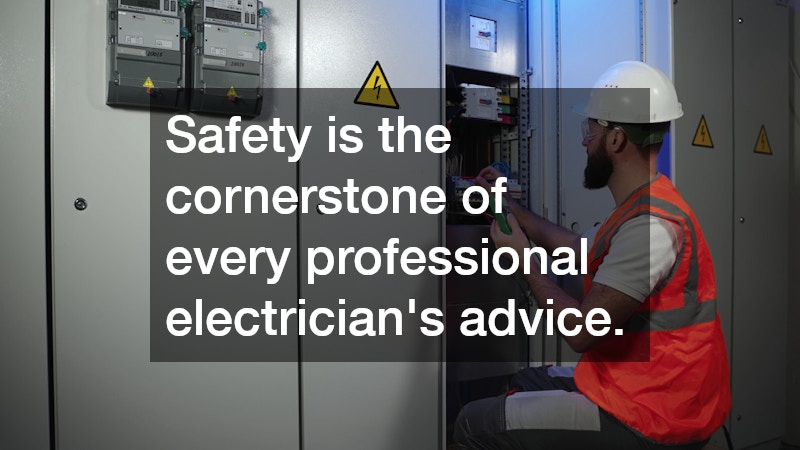Electricity powers nearly every aspect of modern life, from lighting and appliances to heating and entertainment systems. Yet, despite its ubiquity, it remains one of the most common sources of home hazards when not handled correctly. Consulting professional electricians or following their expert guidance is essential for ensuring your home remains safe, efficient, and compliant with current regulations. This article shares top tips from electricians that can help homeowners protect their property, reduce energy costs, and avoid costly electrical mishaps. Understanding and applying these strategies ensures your home is both reliable and safe.
Regular Electrical Inspections
One of the most overlooked aspects of home safety is scheduling routine electrical inspections. Professional electricians recommend that homeowners have their wiring, panels, and outlets checked every few years, especially in older homes. During an inspection, electricians can identify frayed wires, overloaded circuits, outdated breakers, and other potential hazards that may not be obvious to the untrained eye.
Regular inspections are not only about safety—they also improve efficiency. Faulty wiring or corroded connections can reduce electrical flow, causing devices to consume more energy than necessary. Early detection of these issues prevents small problems from escalating into major repairs, safeguarding both your home and your budget. Inspections can also uncover hidden problems, such as improperly grounded outlets or signs of rodent damage, which are difficult to notice without a professional’s expertise.
Upgrade Outdated Systems
Older electrical systems may not meet the demands of today’s technology. Homes built several decades ago often have limited circuit capacity, which can easily be overloaded by modern appliances and electronics. Professional electricians frequently advise upgrading panels, installing additional circuits, or replacing old wiring to handle current loads safely.
Upgrading electrical systems also enhances energy efficiency. Modern breakers and wiring are designed to minimize energy loss, keeping electricity flowing smoothly to every part of your home. Adding outlets in strategic locations can prevent the overuse of extension cords, which are common sources of fire hazards. By investing in system upgrades, homeowners protect their families while creating a more efficient, reliable electrical environment. These improvements also reduce wear and tear on appliances, extending their lifespan and saving money over time.
Use Energy-Efficient Appliances and Lighting
Professional electricians emphasize the importance of energy-efficient appliances and lighting as part of a safe and efficient home. Replacing incandescent bulbs with LED lighting reduces energy consumption and lowers your electricity bills. Similarly, selecting Energy Star-rated appliances ensures that you’re using products designed to maximize performance while minimizing unnecessary energy use.
In addition to cost savings, energy-efficient appliances produce less heat, which reduces strain on your home’s wiring and lowers the risk of overheating or fire. Smart home technologies, such as programmable thermostats, motion-sensor lighting, and energy monitors, allow homeowners to control energy usage more precisely, further enhancing both safety and efficiency. Regular maintenance of appliances, such as cleaning filters and checking cords, also improves performance and ensures safe operation. These simple steps, guided by electricians’ recommendations, can have a long-lasting impact on your home’s energy profile.
Prioritize Electrical Safety Practices
Safety is the cornerstone of every professional electrician’s advice. Common tips include avoiding overloading outlets, never using damaged cords, and keeping water away from electrical equipment. Ground-fault circuit interrupters (GFCIs) should be installed in areas prone to moisture, such as kitchens, bathrooms, and laundry rooms, to prevent electrical shocks.
Electricians also recommend that homeowners familiarize themselves with their circuit breaker panel, know how to shut off electricity in an emergency, and never attempt complex repairs without proper knowledge or tools. Childproofing outlets and securing cords can prevent accidents in homes with young children. Additionally, keeping flammable materials away from heat-producing appliances and ensuring proper ventilation around electrical equipment are crucial for preventing fire hazards. Following these basic practices reduces risk significantly, keeping your family and property safe from electrical hazards.Maintaining a safe and efficient electrical system requires both awareness and action. By scheduling regular inspections, upgrading outdated wiring, using energy-efficient appliances, and following core safety practices, homeowners can enjoy peace of mind and reduce energy costs. Listening to the guidance of professional electricians ensures that your home is not only compliant with modern standards but also optimized for everyday living. Prioritizing electrical safety and efficiency today helps prevent hazards tomorrow, making your home a safer, smarter, and more energy-conscious place for everyone. With careful attention to these strategies, you can protect your property, your family, and your wallet.




